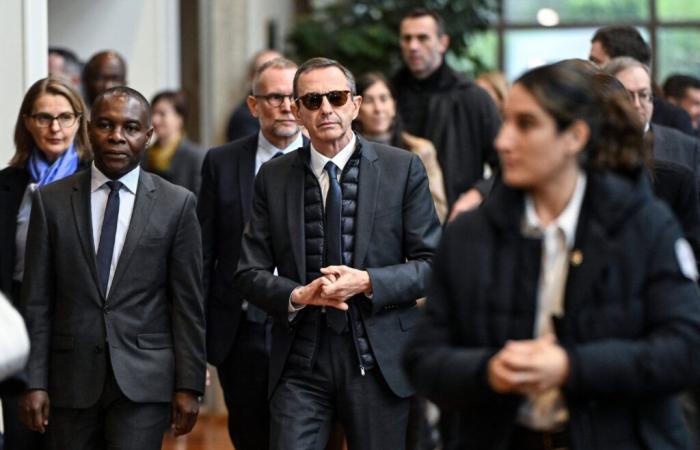
“Algeria seeks to humiliate France.” When traveling to Nantes, Bruno Retailleau did not beat around the bush. Asked about the return, Thursday, to France of the Algerian influencer Doualemn expelled the same day to his country, the minister estimated that “we had reached an extremely worrying threshold with Algeria”. This 59-year-old influencer was arrested in Montpellier, after a video posted on TikToK where he had made calls for murder online. Placed Tuesday in an administrative detention center (CRA) in Nîmes, he was put on a plane Thursday afternoon, but was returned to France on Thursday evening, Algeria having “banned him from territory”, according to the ministry of the Interior. “France cannot tolerate this situation. We must now evaluate all the means at our disposal vis-à-vis Algeria to defend our interests”, he called, stressing that these measures must be studied “at the highest level”, by the President and the Prime Minister.
“The Minister of the Interior wanted to make a publicity stunt which came back to him in the face”
Five months after taking office, Bruno Retailleau, who regularly promises on his networks and in the media, not to “let anything go” when it comes to the “entryism” of the Muslim Brotherhood, sees, for the first time, his authority publicly called into question.
“It’s a dismal affair. Zero tolerance for this type of influencer, but the Minister of the Interior wanted to make a publicity stunt which came back to him in the face. He cannot allow himself to become agitated on such important subjects in a context of deterioration of France’s voice in Africa,” reprimands the president of the socialist group in the Senate, Patrick Kanner.
“The Algerian political power does not want reconciliation”
This standoff is, in fact, part of an already degraded bilateral relationship between France and Algeria. The arrest of Boualem Sansal, a Franco-Algerian writer in mid-November upon his arrival in Algeria, had already been perceived in France as a response from the Algerian government to France’s recognition this summer of Moroccan sovereignty over the Sahara. Western. For the senator of Hauts-de Seine, Roger Karoutchi, Franco-Algerian relations are exploited for internal political purposes by the President of the Algerian Republic. “To ensure his credibility, President Tebboune understood that he had every interest in mobilizing public opinion in his country against the former colonial power. The Algerian political power does not want reconciliation. When you listen to certain Algerian ministers you have the impression that their nationals are suffering apartheid in France. Even before France’s recognition of Moroccan sovereignty over Western Sahara, President Tebboune had canceled a trip to France three times. Bruno Retailleau is right. We have no other choice but to go to the balance of power,” he emphasizes.
Among the avenues available to the executive, one of them is regularly mentioned by the Minister of the Interior: the denunciation of the Franco-Algerian agreement signed on December 27, 1968 and which, according to Bruno Retailleau, allows Algerians to benefit from “very advantageous conditions in terms of family immigration with exemptions from the provisions of common law”, he explained last November before the Senate Law Committee.
“Repentance and continued guilt is what brought us to where we are today.”
“We have to stop being nice to this country that makes fun of us. He must be considered like the others. The Algerian war is far behind us. Repentance and ongoing guilt is what has brought us to today’s situation. By refusing access to its territory to one of its nationals with a valid passport, Algeria has made itself at fault and France must say it loud and clear”, supports LR senator, Jacqueline Eustache- Brinio.
The centrist deputy, Philippe Bonnecarrère who was, last year, as a senator, co-rapporteur of the immigration law, would rather advise proceeding in stages. “Regaining good relations with Algeria appears out of reach at present. The question is whether France will raise its voice or avoid getting into one-upmanship? Denouncing the 68 agreement, blocking money transfers to Algeria… are measures which target Mr. and Mrs. Everyone and not the Algerian Nomenklatura. And we saw it not so long ago with the conditionality of the issuance of visas on consular passes, this policy is a failure. This is why I suggest instead drastically reducing the number of service passports which are the equivalent of diplomatic passports.”
On the left, socialist senator Corinne Narassiguin, co-rapporteur of an information mission on the international agreements concluded by France on migration matters, highlights the “rush” of the minister to expel this Algerian national while “justice was in doing his job.” He must, in fact, be judged on February 24 in Montpellier. “Bruno Retailleau shows an obsession with denouncing this 68 agreement. We cannot therefore be surprised that the Algerians are not cooperative. We can, in this respect, draw inspiration from what we have done with Morocco, with which relations have been strained in recent years. Since we resumed normalized relations, we have been able to discuss migration policy.” Taking the opposite view from the LR elected officials cited above, the senator urges them “to accept that France maintains specific relations with Algeria”. “With the exception of New Caledonia, it is the only former settlement colony of France. There is something organic about this historical proximity. Tightening the conditions for family reunification or whatever, will not prevent the numerous Franco-Algerian families from continuing and growing.”
“This affair will also be a test for other members of the government”
The environmentalist senator, Guy Benarroche, questions the minister’s choice to hasten the expulsion of this “influencer” without having the prior agreement of Algeria. “Either it’s deliberate, or it’s amateurism.” A point raised by the lawyers of “Doualemn” that Beauvau has not yet clarified. The environmentalist senator sees in this affair “the exploitation by Bruno Retailleau of the ideological corpus of the extreme right for internal political purposes”.
“Bruno Retailleau is in his absolute role. He had also warned after the fall of the Barnier government that he would only stay in office if he had the means to pursue an effective migration policy,” replies Roger Karoutchi before concluding: “This affair will also be a test for the other members of the government.





